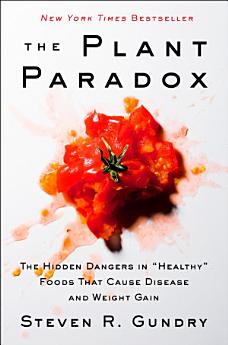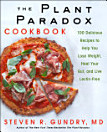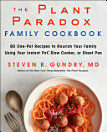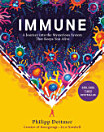The Plant Paradox: The Hidden Dangers in "Healthy" Foods That Cause Disease and Weight Gain
About this ebook
Most of us have heard of gluten—a protein found in wheat that causes widespread inflammation in the body. Americans spend billions of dollars on gluten-free diets in an effort to protect their health. But what if we’ve been missing the root of the problem? In The Plant Paradox, renowned cardiologist Dr. Steven Gundry reveals that gluten is just one variety of a common, and highly toxic, plant-based protein called lectin. Lectins are found not only in grains like wheat but also in the “gluten-free” foods most of us commonly regard as healthy, including many fruits, vegetables, nuts, beans, and conventional dairy products. These proteins, which are found in the seeds, grains, skins, rinds, and leaves of plants, are designed by nature to protect them from predators (including humans). Once ingested, they incite a kind of chemical warfare in our bodies, causing inflammatory reactions that can lead to weight gain and serious health conditions.
At his waitlist-only clinics in California, Dr. Gundry has successfully treated tens of thousands of patients suffering from autoimmune disorders, diabetes, leaky gut syndrome, heart disease, and neurodegenerative diseases with a protocol that detoxes the cells, repairs the gut, and nourishes the body. Now, in The Plant Paradox, he shares this clinically proven program with readers around the world.
The simple (and daunting) fact is, lectins are everywhere. Thankfully, Dr. Gundry offers simple hacks we easily can employ to avoid them, including:
- Peel your veggies. Most of the lectins are contained in the skin and seeds of plants; simply peeling and de-seeding vegetables (like tomatoes and peppers) reduces their lectin content.
- Shop for fruit in season. Fruit contain fewer lectins when ripe, so eating apples, berries, and other lectin-containing fruits at the peak of ripeness helps minimize your lectin consumption.
- Swap your brown rice for white. Whole grains and seeds with hard outer coatings are designed by nature to cause digestive distress—and are full of lectins.
With a full list of lectin-containing foods and simple substitutes for each, a step-by-step detox and eating plan, and delicious lectin-free recipes, The Plant Paradox illuminates the hidden dangers lurking in your salad bowl—and shows you how to eat whole foods in a whole new way.
Ratings and reviews
- Flag inappropriate
- Flag inappropriate
- Show review history
- Flag inappropriate
About the author
Steven R. Gundry, MD, is the director of the International Heart and Lung Institute in Palm Springs, California, and the founder and director of the Center for Restorative Medicine in Palm Springs and Santa Barbara. After a distinguished surgical career as a professor and chairman of cardiothoracic surgery at Loma Linda University, Dr. Gundry changed his focus to curing modern diseases via dietary changes. His bestselling books include The Gut-Brain Paradox, Gut Check, Unlocking the Keto Code, The Energy Paradox, The Plant Paradox Family Cookbook, The Longevity Paradox, The Plant Paradox Quick and Easy, The Plant Paradox Cookbook, and The Plant Paradox, and has written more than three hundred articles published in peer-reviewed journals on using diet and supplements to eliminate heart disease, diabetes, autoimmune disease, and multiple other diseases. He is the host of the top ranked nutrition podcast Dr. Gundry Podcast and founder of Gundry MD, a wellness brand. Dr. Gundry lives with his wife, Penny, and their dogs in Palm Springs and Montecito, California.







